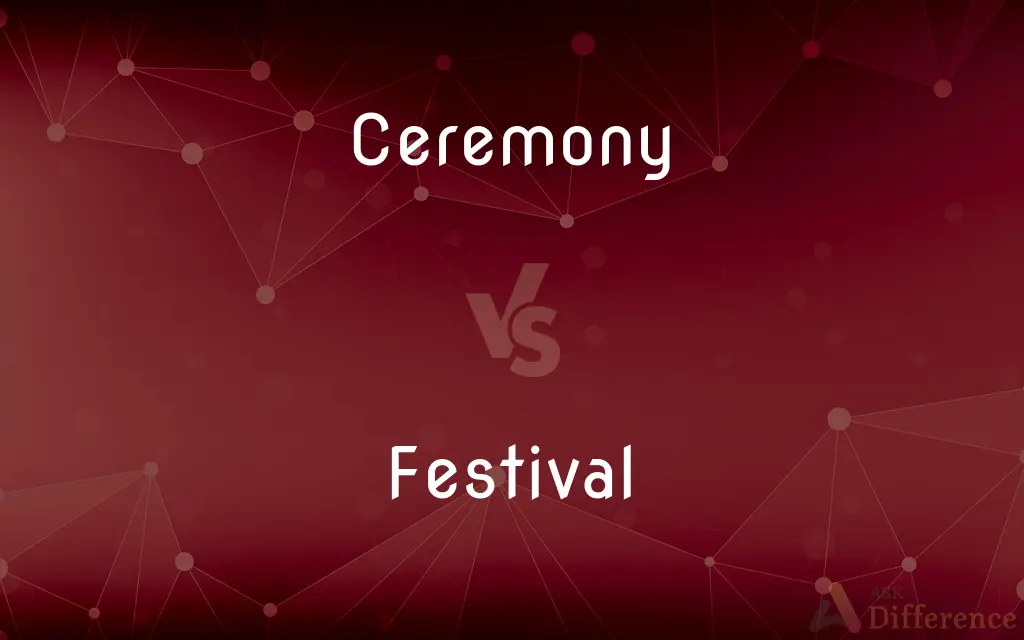Ceremony vs. Festival — What's the Difference?
By Tayyaba Rehman — Updated on October 24, 2023
A ceremony is a formal event marking an important occasion, while a festival is a celebratory event or series of events, often with cultural or religious significance.

Difference Between Ceremony and Festival
Table of Contents
ADVERTISEMENT
Key Differences
"Ceremony" and "festival" both pertain to organized events, but their implications and contexts differ. A ceremony is an event that is structured and often ritualistic, aiming to commemorate, honor, or recognize particular moments, achievements, or transitions. Examples include weddings, graduations, and inaugurations. The essence of a ceremony lies in its formality and often its spiritual or official undertone.
Conversely, a festival is a celebration that can span multiple days and often brings together communities. Festivals frequently revolve around cultural, religious, or seasonal themes, like Christmas, Hanukkah, or harvest festivals. They might include a variety of activities, performances, and food, with an emphasis on enjoyment and participation.
While ceremonies are usually more somber, constrained, and follow a predefined sequence, festivals exude an aura of jubilation and freedom. In ceremonies, attendees are more passive observers, whereas in festivals, participation is often encouraged. Both ceremonies and festivals serve to unite individuals, but they do so in distinct manners: ceremonies through shared respect or reverence, and festivals through shared joy and merriment.
Though both ceremonies and festivals can be public or private, their intentions differ. A ceremony seeks to formalize or validate, while a festival seeks to entertain, celebrate, or both. Understanding this distinction is crucial when participating in or organizing such events, as each requires a different approach and mindset.
Comparison Chart
Nature
Formal and structured
Celebratory and often expansive
ADVERTISEMENT
Duration
Typically shorter, often a single event
Can span multiple days
Participation
Attendees are usually passive observers
Active participation is encouraged
Common Themes
Commemorations, honors, rituals
Cultural, religious, or seasonal celebrations
Ambiance
Solemn, reverent
Joyful, lively
Compare with Definitions
Ceremony
A formal event marking an important occasion.
The graduation ceremony was held at the university's main hall.
Festival
A celebration or series of events centered on a theme.
The music festival attracted thousands of attendees.
Ceremony
A set of traditional or ritualistic actions.
The tea ceremony in Japan is a revered tradition.
Festival
A periodic gathering or event with cultural or religious significance.
Diwali is a major festival celebrated in India.
Ceremony
A ceremony (UK: , US: ) is a unified ritualistic event with a purpose, usually consisting of a number of artistic components, performed on a special occasion. The word may be of Etruscan origin, via the Latin caerimonia.
Festival
An occasion marked by feasting or revelry.
The medieval festival had jousting and banquets.
Ceremony
An official event to honor or commemorate.
A ceremony was held to honor the veterans.
Festival
An organized series of events, such as performances.
The jazz festival featured renowned artists from around the world.
Ceremony
A rite of passage or transition.
The wedding ceremony was beautiful and touching.
Festival
A festival is an event ordinarily celebrated by a community and centering on some characteristic aspect of that community and its religion or cultures. It is often marked as a local or national holiday, mela, or eid.
Ceremony
A formal act or set of acts performed as prescribed by ritual or custom
A wedding ceremony.
The Japanese tea ceremony.
Festival
A day or period of celebration, typically for religious reasons
Traditional Jewish festivals
Ceremony
A conventional social gesture or act of courtesy
The ceremony of shaking hands when introduced.
Festival
An organized series of concerts, plays, or films, typically one held annually in the same place
A major international festival of song
Ceremony
A formal act without intrinsic purpose; an empty form
Ignored the ceremony of asking for comments from other committee members.
Festival
An occasion for feasting or celebration, especially a day or time of religious significance that recurs at regular intervals.
Ceremony
Strict observance of formalities or etiquette
The head of state was welcomed with full ceremony.
Festival
An often regularly recurring program of cultural performances, exhibitions, or competitions
A film festival.
Ceremony
A ritual, with religious or cultural significance.
Festival
Revelry; conviviality.
Ceremony
An official gathering to celebrate, commemorate, or otherwise mark some event.
A graduation ceremony, an opening ceremony
Festival
Of, relating to, or suitable for a feast or festival; festive.
Ceremony
(uncountable) A formal socially established behaviour, often in relation to people of different ranks; formality.
Festival
Pertaining to a feast or feast day; festive. Now only as the noun used attributively.
Ceremony
(uncountable) Show of magnificence, display, ostentation.
Festival
(Bible) A feast or feast day.
Ceremony
(obsolete) An accessory or object associated with a ritual.
Festival
An event or series of special events centred on the celebration or promotion of some theme or aspect of the community, often held at regular intervals.
The Reading and Leeds festivals take place on the August bank holiday.
A Welsh eisteddfod is a literary festival.
Ceremony
(obsolete) An omen or portent.
Festival
In mythology, a set of celebrations in the honour of a god.
Ceremony
Ar act or series of acts, often of a symbolical character, prescribed by law, custom, or authority, in the conduct of important matters, as in the performance of religious duties, the transaction of affairs of state, and the celebration of notable events; as, the ceremony of crowning a sovereign; the ceremonies observed in consecrating a church; marriage and baptismal ceremonies.
According to all the rites of it, and according to all the ceremonies thereof shall ye keep it [the Passover].
Bring her up the high altar, that she mayThe sacred ceremonies there partake.
[The heralds] with awful ceremonyAnd trumpet's sound, throughout the host proclaimA solemn council.
Festival
Fried cornbread.
Ceremony
Behavior regulated by strict etiquette; a formal method of performing acts of civility; forms of civility prescribed by custom or authority.
Ceremony was but devised at firstTo set a gloss on . . . hollow welcomes . . . But where there is true friendship there needs none.
Al ceremonies are in themselves very silly things; but yet a man of the world should know them.
Festival
Pertaining to a fest; festive; festal; appropriate to a festival; joyous; mirthful.
I cannot woo in festival terms.
Ceremony
A ceremonial symbols; an emblem, as a crown, scepter, garland, etc.
Disrobe the images,If you find them decked with ceremonies. . . . Let no imagesBe hung with Cæsar's trophies.
Festival
A day or period of time set aside for feasting and celebration
Ceremony
A sign or prodigy; a portent.
Cæsar, I never stood on ceremonies,Yet, now they fright me.
Festival
An organized series of acts and performances (usually in one place);
A drama festival
Ceremony
A formal event performed on a special occasion;
A ceremony commemorating Pearl Harbor
Festival
A special day or period of celebration.
The film festival showcased international movies.
Ceremony
Any activity that is performed in an especially solemn elaborate or formal way;
The ceremony of smelling the cork and tasting the wine
He makes a ceremony of addressing his golf ball
He disposed of it without ceremony
Ceremony
The proper or conventional behavior on some solemn occasion;
An inaugural ceremony
Ceremony
A procedure established by custom or authority.
The opening ceremony of the Olympics is a global event.
Common Curiosities
Are ceremonies and festivals the same?
No, ceremonies are formal events marking occasions, while festivals are celebratory events often with cultural or religious themes.
Can a festival include ceremonies?
Yes, festivals can encompass ceremonies as part of their broader celebration.
Is a wedding a ceremony or a festival?
A wedding is a ceremony, but the extended celebrations can resemble a festival.
Why are ceremonies often solemn?
Ceremonies often honor or commemorate significant events or achievements, requiring reverence.
Are festivals longer than ceremonies?
Festivals often span multiple days, while ceremonies are typically shorter, singular events.
Can ceremonies be informal?
While ceremonies are typically formal, they can vary based on cultural or personal preferences.
Can a single event be both a ceremony and a festival?
While distinct, an event can have ceremonial aspects and festive elements, blending the two.
Which is more structured, a ceremony or a festival?
Ceremonies are generally more structured, following a set sequence or ritual.
Are festivals always religious?
No, festivals can be cultural, seasonal, or based on other themes like music or film.
Can anyone start a festival?
Yes, with proper organization and resources, individuals or groups can initiate festivals.
Is audience participation common in ceremonies?
In ceremonies, attendees are usually passive observers, but there can be exceptions.
What is the primary aim of festivals?
Festivals aim to celebrate, entertain, and bring communities together.
Can a festival be a private event?
Yes, festivals can be private or public, depending on the intention and scale.
Are festivals always joyful?
While festivals emphasize joy, some may have solemn or reflective components.
Are all ceremonies religious?
No, ceremonies can be secular or religious, depending on the context and intent.
Share Your Discovery

Previous Comparison
Guarantee vs. Security
Next Comparison
Lessor vs. LandlordAuthor Spotlight
Written by
Tayyaba RehmanTayyaba Rehman is a distinguished writer, currently serving as a primary contributor to askdifference.com. As a researcher in semantics and etymology, Tayyaba's passion for the complexity of languages and their distinctions has found a perfect home on the platform. Tayyaba delves into the intricacies of language, distinguishing between commonly confused words and phrases, thereby providing clarity for readers worldwide.
















































